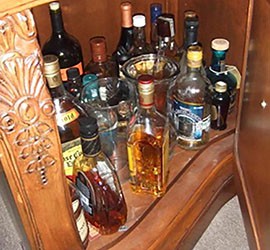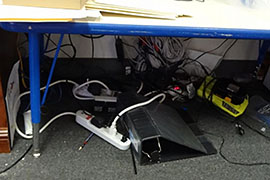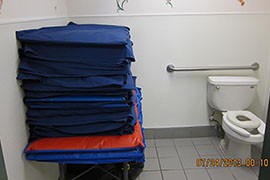Cronkite News has moved to a new home at cronkitenews.azpbs.org. Use this site to search archives from 2011 to May 2015. You can search the new site for current stories.
Federal audits say state inspection of day-care centers could be improved
WASHINGTON – Alcohol stored in an unlocked cabinet, a dirty fish tank and a smelly diaper bin – that’s just a sampling of the health and safety infractions federal inspectors spotted at a handful of Arizona child care centers.
In two reports this month, the Department of Health and Human Services said that while Arizona officials do the required number of child care center inspections, they may not have ensured “that each provider complied with one or more State licensing requirements to ensure the health and safety of children.”
State officials did not dispute the findings and said they would address the shortcomings cited in the reports – but noted that the federal inspections were only a snapshot in time and that “not all providers meet all requirements, all of the time.”
Advocates who had seen the reports questioned the size of the federal audits, which looked at three of the 896 commercial child care operations in the state and 20 of the 434 home providers.
“I think it’s just random and unfortunate,” said Erin Raden, executive director of the Arizona Child Care Association. “I think it would have been just as likely for them to randomly choose three centers that were perfect on that day.”
The Arizona inspections were part of a nationwide check in 2013 by federal inspectors looking into centers and providers that receive federal money through the Child Care and Development Fund, which provides subsidized child care for low-income families.
In Arizona, that federal fund is overseen by the Arizona Department of Economic Security, but the Arizona Department of Health Services is in charge of the licensing and inspecting of the facilities.
After the release of the reports by HHS’ Office of Inspector General, both of the state departments agreed that some areas of inspections could be improved.
Raden said that health and safety infractions, especially ones similar to those cited in the report, are easy to remedy.
“Basically, health and safety infractions just happen because somebody wasn’t paying attention that day or that center’s administrative practices failed temporarily,” she said. “Those health and safety infractions are not things that we need to figure out how to fix, those are easily fixed.”
Loving Care Day Care in Avondale was one of the centers inspected. Owner Maria Pavoggi said she felt the report was “over-exaggerated” and was surprised to see that it criticized the state inspections.
“The state’s doing a good job,” Pavoggi said. “A very good job. I was very upset when I read that report.”
Pavoggi said the federal inspectors did not look to see what children were learning and focused only on the physical appearance of the facility – even in rooms where children were not allowed.
Inspectors cited the center for electrical cords hanging under the computer in her office, Pavoggi said. Now, she always locks her office door, even though children are not allowed in that part of the facility.
Pavoggi said she has never had a major accident in 30 years in the day-care business. After the federal inspection, a state inspection found no infractions.
“We have regulations, regulations by the state of Arizona, and we follow those,” Pavoggi said. “How can we run a day care center without following?”
The report on commercial day care centers recommended that the Department of Health Services ensure all health and safety requirements through “effective monitoring,” inspect all unlocked rooms in the centers and develop a new policy to verify fingerprint clearance cards.
Tom Salow, licensing branch chief of the Arizona Department of Health Services, said the department agreed with all three recommendations, but that checking behind all unlocked doors could present some legal issues for the department.
Areas in day care centers where children are not allowed are unlicensed space and beyond the jurisdiction of the department, Salow said. He said it is the teacher’s responsibility to make sure children do not go into unlicensed space.
“We’re looking at a supervision issue,” Salow said. “It’s not that it’s locked or unlocked, it’s the fact that there should be proper supervision and that shouldn’t be an issue.”
The report on home day-care providers recommended that the state ensure all health and safety requirements through “effective monitoring,” develop policies requiring certification specialists to attend regular health and safety training, strengthen programs to review fingerprint clearance cards and perform criminal record and child-abuse registry checks.
In a written response to the report, Clarence Carter, who was then director of the Arizona Department of Economic Security, said that the state partially agreed with the recommendations, but believed there were some areas that federal inspectors wrongfully cited.
Salow said that when the Department of Health Services does inspections, auditors keep in mind that the visit is a “snapshot” of what occurs at that center.
“We’re looking for things that are occurring at that moment,” Salow said. “Every day something different may occur there. There might be a different hazard, there might be something else that is not compliant.”









